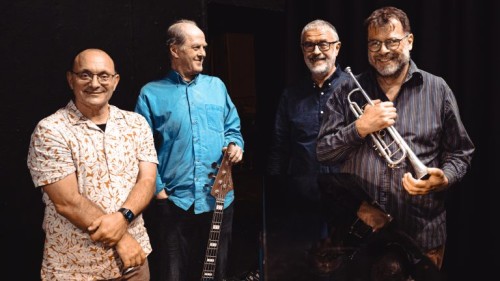
by Trevor Bannister
October 09, 2024
/ LIVE
"An enthralling evening of Latin Jazz". Guest contributor Trevor Bannister enjoys the sight and sound of "four musicians of world class stature" and pays tribute to the late Sergio Mendes.
Jazz at Progress
Friday 27th September 2024
Steve Waterman’s Latin Jazz Quartet
Steve Waterman trumpet & flugelhorn, John Donaldson piano, Rob Statham - bass, Buster Birch - drums
The new season of Jazz at Progress opened to a full house on 27 September in the welcome company of Steve Waterman’s Latin Jazz Quartet, four musicians of world class stature steeped in the excitement, language, rich heritage and joyfully expressive spirit of what Jelly Roll Morton, the legend of early classic jazz, termed ‘The Spanish Tinge’.
Steve Waterman is one of the greatest of contemporary brass players whose distinct sound and style medium paced tribute to pianist/composer Chucho Valdes, the ‘God Father’ of Cuban jazz, also reminds us that on more than one occasion Waterman has graced the trumpet section of Chucho’s band at the Havana Jazz Festival. Can there be any higher accolade than that?
‘Recardo Bossa Nova’, written by Djaima Ferreira and Luis Antonio, lays claim to being the first bossa nova to be recorded, originally as a vocal and subsequently by a host of artists as an instrumental. Tenor saxophone star Hank Mobley brought it to the attention of hard bop fans as a feature on his 1965 Blue Note album, ‘Dippin’ – though as a floating samba, in which form the Waterman Quartet delighted the Progress audience. Great solo excursions by Waterman on flugelhorn and John Donaldson at the piano.
The mournful press rolls of Buster Birch’s snare drum and Waterman’s piercing trumpet, set the scene for Astor Piazolla’s ‘Oblivion’, an extraordinarily beautiful, yet emotionally devastating tango.
The hard driving mambo, ‘Oye Como Va’, quickly restored the spirits. First recorded by Tito Puente in 1962 and later to even greater acclaim by Carlos Santana, it’s an anthem for good times and an open invitation to dance.
Pianist composer Horace Silver used the ‘Spanish Tinge’ to great effect on many of his compositions. He possessed that rare gift of coming up with catchy tunes that provided plenty of scope for jazz expression. ‘Nica’s Dream’, dedicated to Baroness Pannonica de Koenigswarter, is a case in point. This patroness of jazz was believed to have been named Pannonica, after a species of butterfly. The tune expresses the attributes of this delicate creature. Only in later years did someone shatter this beautiful imagery by declaring that a Pannonica is in fact a moth! No matter, this knowledge didn’t get in the way of a spellbinding performance from the quartet, with John Donaldson’s dazzling piano to the fore.
One doesn’t usually think of Henley-on-Thames as being a hot bed of Latin fervour. Yet it provided the backdrop to the closing tune of the first set in so far as Steve Waterman was living there at the time when he wrote ‘Songo for Mia’, an exhilarating outing in Latin funk, as a dedication to his daughter. .
My view of Rob Statham was obscured by the piano, but his strong presence and original voice on fretless bass was both felt and heard to great effect throughout ‘BB’, the first of two extended pieces from ‘Concerto for Congas’ which opened the second set. This commission from conga player Richard Jones was recorded in Oxford by a large ensemble in 2001. Incidentally, the orchestra included several musicians who will be well known to followers of jazz in the Thames Valley, notably saxophonists Ewen Baird and Geoff Hawkins and guitarist Jez Cooke.
The second piece, ‘Nowhere to Go’ set off at an unnerving pace propelled by the full percussive power of Buster Birch’s battery of instruments. Steve Waterman’s plaintive, rather formalised, trumpet, contrasted beautifully with the knife-edged activity going on around him. An object lesson in seamless invention.
‘Mas Que Nada’, a popular success for Sergio Mendes in 1966 with an exotic blend of instruments and voices, and an even bigger hit in a 2006 remake with the Black Eyed Peas, has lost none of its appeal in the intervening years. I loved Rob Statham’s contributions on bass and the subtle interplay between the musicians.
It seems barely possible that almost half a decade has passed since the world as we knew it came to an abrupt halt in the wake of the Covid pandemic and subsequent Lockdown. ‘Lonely Street’, Steve Waterman’s personal statement, powerfully captured the enigmatic nature of those strange times; when one could savour the tranquillity of empty streets, clear skies and the chance to hear birdsong, while at the same time yearning for human contact and activity. The beautifully reflective piano from John Donaldson and sensitive support of Rob Statham and Buster Birch – his use of cymbals was simply amazing – underpinned this outstanding performance.
‘Manteca’, which translates as ‘lard’ in English (Cuban slang for heroin), co- written by Dizzy Gillespie and Cuban conga drummer, Chano Pozo, caused a sensation when it was first performed in 1947 by Dizzy’s big band. Sadly, Chano’s time with the band was short lived – literally, he died in violent circumstances in December 1948. But he had made his mark and this show-stopping number to top all show-stopping numbers remained in Dizzy’s repertoire until the end of his career. On this occasion, it made a climactic finale to an enthralling evening of Latin Jazz from Steve Waterman and his compatriots. The rhythm section racked up layer upon layer of hair-raising tension ahead of Waterman’s breathtaking flight into the stratosphere. What could one say, other than ‘WOW!’
As ever our thanks to the Progress Front of House team for their warm hospitality and especially to Rich Saunders for his sterling efforts to overcome technical challenges in the lighting box.
This review is dedicated to the memory of Sergio Mendes -11 February 1941 – 5 September 2024
https://www.youtube.com/watch?v=4Zu0iDvCjgk
TREVOR BANNISTER